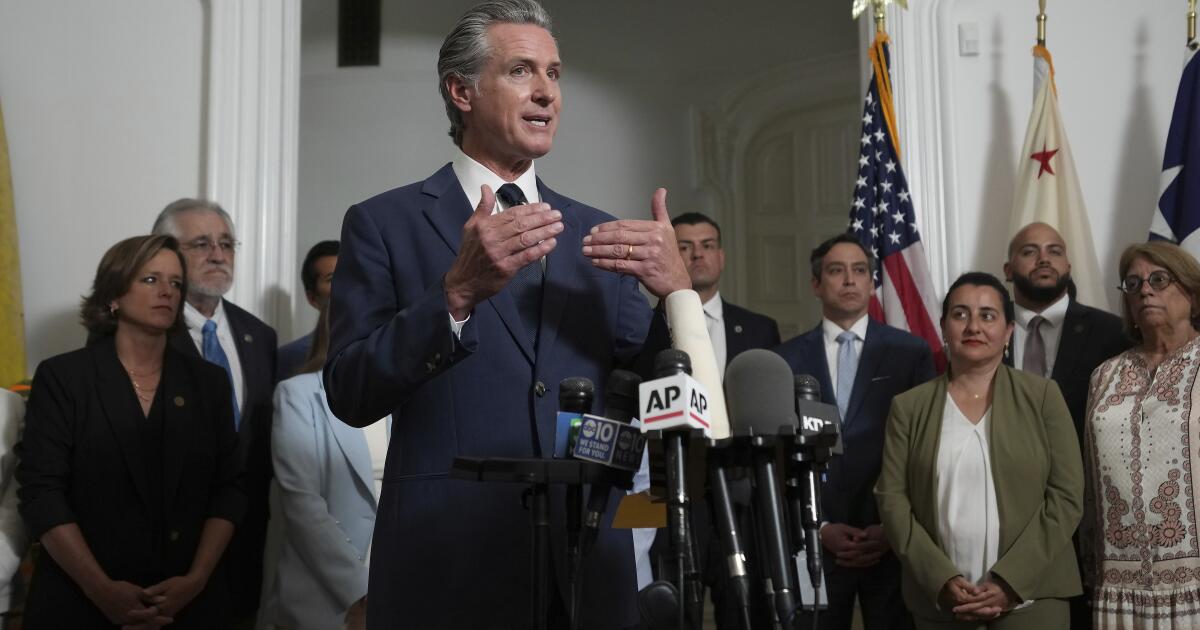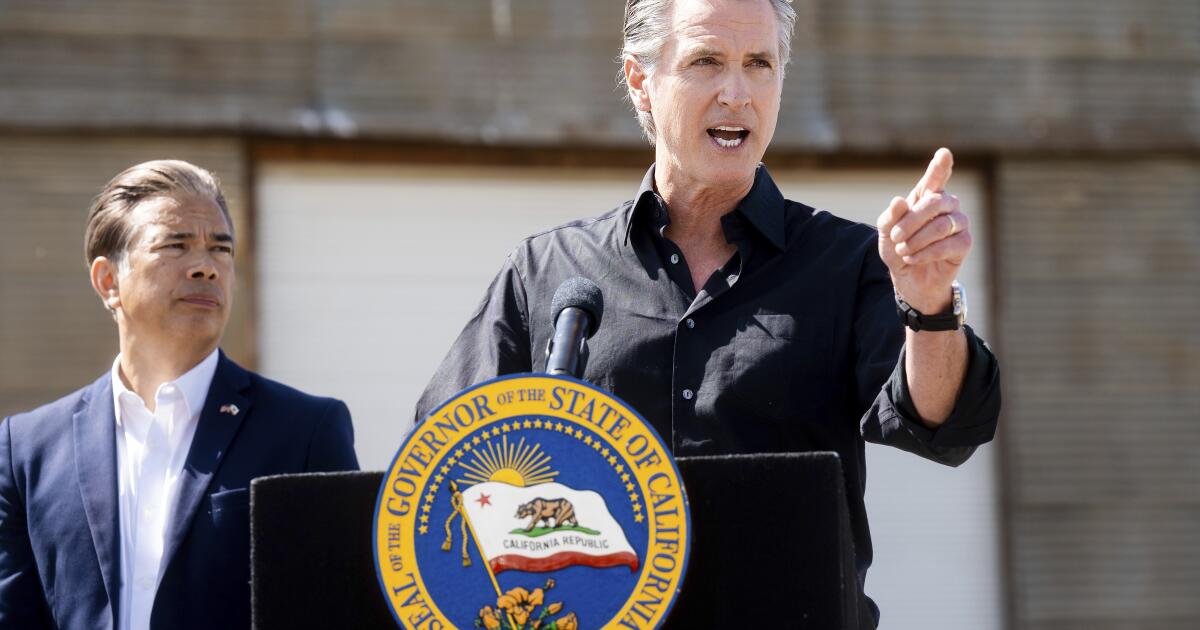Prop. 50 is part of a historically uncertain moment in American democracy
Is President Trump going to restart nuclear weapons testing? When will this federal shutdown end? Will Californians pass Proposition 50, scramble the state’s congressional maps and shake up next year’s midterm elections?
Amid a swirl of high-stakes standoffs and unprecedented posturing by Trump, Gov. Gavin Newsom and other leaders in Washington and Sacramento, the future of U.S. politics, and California’s role therein, has felt wildly uncertain of late.
Political debate — around things such as sending military troops into American cities, cutting off food aid for the poor or questioning constitutional guarantees such as birthright citizenship — has become so untethered to longstanding norms that everything feels novel.
The pathways for taking political power — as with Trump’s teasing a potential third term, installing federal prosecutors without Senate confirmation, slashing federal budgets without congressional input and pressuring red states to redistrict in his favor before a midterm election — have been so sharply altered that many Americans, and some historians and political experts, have lost confidence in U.S. democracy.
“It’s completely unprecedented, completely anomalous — representative, I think, of a major transformation of our normal political life,” said Jack Rakove, a Stanford University emeritus professor of history and political science.
“You can’t compare it to any other episode, any other period, any other set of events in American history. It is unique and radically novel in distressing ways,” Rakove said. “As soon as Trump was reelected, we entered into a constitutional crisis. Why? Because Trump has no respect for constitutional structures.”
Abigail Jackson, a White House spokesperson, said in a statement that “President Trump’s unorthodox approach is why he has been so successful and why he has received massive support from the American public.”
Jackson said Trump has “achieved more than any President has in modern history,” including in “securing the border, getting dangerous criminals off American streets, brokering historic peace deals [and] bringing new investments to the U.S.,” and that the Supreme Court has repeatedly backed his approach as legal.
“So-called experts can pontificate all they want, but President Trump’s actions have been consistently upheld by the Supreme Court despite a record number of challenges from liberal activists and unlawful rulings from liberal lower court judges,” Jackson said.
There are many examples of Trump flouting or suggesting he will flout the Constitution or other laws directly, and in ways that make people unsure and concerned about what will come next for the country politically, Rakove and other political experts said. His constant flirting with the idea of a third term in office does that, as does his legal challenge to birthright citizenship and his military’s penchant for blasting alleged drug vessels out of international waters.
On Wednesday, Trump raised the prospect of further breaching international law and norms by appearing to suggest on social media that, for the first time in three decades, the U.S. would resume testing nuclear weapons.
“Because of other countries testing programs, I have instructed the Department of War to start testing our Nuclear Weapons on an equal basis,” Trump wrote — leaving it unclear whether he meant detonating warheads or simply testing the missiles that deliver them.
There are also many examples, the experts said, of American political norms being tossed aside — and the nation’s political future tossed in the air — by others around Trump, both allies and enemies, who are trying to either please or push back against the unorthodox commander in chief with their own abnormal political maneuvers.
One example is House Speaker Mike Johnson (R.-La.) refusing to swear in Adelita Grijalva, despite her being elected in September to represent parts of Arizona in Congress. Johnson has cited the shutdown, but others — including Arizona’s attorney general in a lawsuit — have suggested Johnson is trying to prevent a House vote on releasing records about the late Jeffrey Epstein, the disgraced billionaire sex offender whom Trump was friends with before a reported falling out years ago.
Uncertainty about whether those records would implicate Trump or any other powerful people in any wrongdoing has swirled in Washington throughout Trump’s term — showing more staying power than perhaps any other issue, despite Trump’s insistence that he’s done nothing wrong and the issue is a distraction.
The mid-decade redistricting battle — in which California’s Proposition 50 looms large — is another prime example, the experts said.
Normally, redistricting occurs each decade, after federal census data comes out. But at Trump’s urging, Texas Gov. Greg Abbott agreed to redraw his state’s congressional lines this year to help ensure Republicans maintain control of the House in the midterms. In response, Newsom and California Democrats introduced Proposition 50, asking California voters to amend the state Constitution to allow Democrats to redraw lines in their favor.
As a result, Californians — millions of whom have already voted — have been getting bombarded by messages both for and against Proposition 50, many of which are hyper-focused on the uncertain implications for American democracy.
“Let’s fight back and democracy can be defended,” a Proposition 50 backer wrote on a postcard to one voter. “It is against democracy and rips away the power to draw congressional seats from the people,” opponents of the measure wrote to others.
H.W. Brands, a U.S. history professor at the University of Texas at Austin, said, “Americans who are worried about democracy are right to be concerned,” because Trump “has broken or threatened many of the guardrails of democracy.”
But he also noted — partly as a reflection of the dangerous moment the country is in — that Trump has long rejected a particularly “sacred” part of American democracy by refusing to accept his loss to President Biden in 2020, and Americans reelected him in 2024 anyway.
“Americans have always been divided politically. This is the first time (with the exception of 1860) that the division goes down to the fundamentals of democracy,” Brands wrote in an email — referencing the year the U.S. Confederacy seceded from the Union.
High stakes
The uncertainty has festered in an era of rampant political disinformation and under a president who has a penchant for challenging reality outright on a near-daily basis — who on a trip through Asia this week not only said he’d “love” a third term, which is precluded by the Constitution, but claimed, falsely, that he is experiencing his best polling numbers ever.
The uncertainty has also been compounded by Democrats, who have wielded the only levers of power they have left by refusing to concede to Republicans in the raging shutdown battle in Washington and by putting Proposition 50 to California voters.
The shutdown has major, immediate implications. Not only are federal employees around the country, including in California, furloughed or without pay checks, but billions in additional federal funding is at risk.
Democrats have resisted funding the government in an effort to force Republicans to back down from massive cuts to healthcare subsidies that help millions of Californians and many more Americans afford health coverage. The shutdown means Supplemental Nutrition Assistance Program benefits could be cut off for more than 40 million people — nearly 1 in 8 Americans — this weekend.
California and other Democrat-led states have sued the Trump administration, asking a federal court to issue an emergency order requiring the USDA to use existing contingency funds to distribute SNAP funding.
Jackson, the White House spokesperson, said Democrats should be asked when the shutdown will end, because “they are the ones who have decided to shut down the government so they can use working Americans and SNAP benefits as ‘leverage’ to pursue their radical left wing agenda.”
The redistricting battle could have even bigger impact.
If Democrats retook the House next year, it would give them a real source of oversight power to confront Trump and block his MAGA agenda. If Republicans retain control, they will help facilitate Trump’s agenda — just as they have since he took office.
But even if Proposition 50 passes, as polling suggests it will, it’s not clear that Democrats would win all the races lined up for them in the state, or that those seats would be enough to win Democrats the chamber given efforts to pick up Republican seats in Texas and elsewhere.
The uncertainty around the midterms is, by extension, producing more uncertainty around the second half of Trump’s term.
What will Trump do, particularly if Republicans stay in power? Is he stationing troops in American cities as part of some broader play for retaining power, as some Democrats have suggested? Is he setting the groundwork to challenge the integrity of U.S. elections by citing his baseless claims about fraud in 2020 and putting fellow election deniers in charge of reviewing the system?
Is he really gearing up to contest the constitutional limits on his tenure in the White House? He said he’d “love” to stay in office this week, but then he said it’s “too bad” he’s not allowed to.
Fire with fire?
According to David Greenberg, a history professor at Rutgers University, it is Trump’s unorthodox policies and tactics but also his brash demeanor that “make this a more unsettled moment than we are used to feeling.”
“Sometimes when he’s doing things that other presidents have done, he does it in such an outlandish way that it feels unprecedented,” or is “stylistically” but not substantively unprecedented, Greenberg said. “Self-aggrandizing claims, often untrue. The brazenness with which he insults people. The way he changes his mind on something. That all is highly unusual and unique to Trump.”
In other instances, Greenberg said, Trump has pushed the boundaries of the law or busted political norms that previous presidents felt bound by.
“One thing that Trump showed us is just how much of our functioning system depends not just on the letter of the law but on norms,” Greenberg said. “What can the president do? What kind of power can he exert over the Justice Department and who it prosecutes? Well, it turns out he probably can do a lot more than should be permissible.”
However, the appropriate response is not the one seemingly gaining steam among Democrats — to “be more like Trump” themselves or “fight fire with fire” — but to look for ways to strengthen the political norms and boundaries Trump is ignoring, Greenberg said.
“The more the public, citizens in general, feel that it’s OK to disregard long-standing ways of doing things that have stood the test of time until now, the more likely we are to enter into a more chaotic world — a world in which there will be less justice, less democracy,” Greenberg said. “It will be more subject to the whims or preferences of whoever is in power — and in a liberal democracy, that is what you are striving to fight against.”




